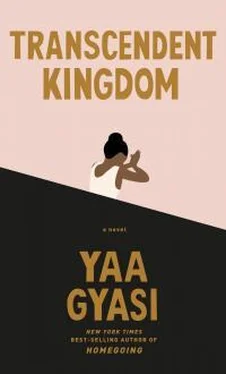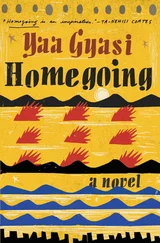“Who?” Nana said.
“Daddy,” I said, the word sounding strange to my ears. A word from a language I used to speak but was forgetting, like the Twi our parents had taught us when we were small but then had grown too tired to keep up.
“I don’t give a fuck what he thinks,” Nana said.
My eyes widened at the use of the swear word. They were all understood to be forbidden in our house, though our mother used the Twi ones with abandon because she thought we didn’t know what they meant. Nana wasn’t looking at me. He was setting up his shot. I stared at his long arms, the veins tracing their way from biceps to hand, pulsing, exclamation points on those newly formed muscles. He hadn’t answered my question, but it didn’t really matter. He was answering his own question, one whose large, looming presence must have been something of a burden to him, and so he lied to try to get out from under its weight. I don’t care, he told himself every time he spoke to the Chin Chin Man on the phone. I don’t care, when he scored twenty points in a game, looked up to the stands to find his bored sister and mother and no one else. I don’t care.
Nana made the shot from the crest of our driveway’s hill. It was a shot he knew I couldn’t make. He threw the ball at me, hard. I caught it against my chest and told myself not to cry as I walked to the spot where Nana had stood. I stared at the little red target on the backboard and tried to channel everything I had toward it. A couple of months later, Nana would climb a ladder and scrape that red rectangle off, hoping that he would learn to make his shots by feel, by sense memory. I bounced the ball a couple of times and looked at Nana, whose expression was indiscernible. I missed the shot, and the game ended. Well after the sun set that night, Nana was still out in our driveway, shooting free throws against the backdrop of the moon.
—
In Hamilton and Fremouw’s 1985 study on the effects of cognitive behavioral training on basketball free-throw performance, researchers asked three college basketball players with low game-to-practice free-throw ratios to listen to tape recordings with instructions for deep muscle relaxation. The men were also tasked with watching videotapes of themselves playing basketball, while attempting to reconstruct the thoughts they were having in each moment that played back to them. The researchers wanted them to identify any moments when they experienced negative self-evaluation and to instead try to cultivate positive self-statements. So, instead of thinking “I’m the worst. I’ve never been good at anything in my life. How did I even make it onto this team?” they were to aim for “I got this. I’m capable. I’m here for a reason.” By the end of the training program, all three subjects had improved by at least 50 percent.
I don’t know what thoughts ran through Nana’s mind in those days. I wish I did. Because of my career, I would give a lot to be able to inhabit someone else’s body—to think what they’re thinking, feel what they’re feeling. For a copy of Nana’s thoughts, from birth to death, bound in book form, I would give absolutely anything. Everything. But since accessing his mind has never been possible, I resort to speculating, assuming, feeling—modes of logic with which I have never been entirely comfortable. My guess is that it wasn’t just Nana’s body that couldn’t sit still. He had a mind that was always thrumming. He was curious, intense, often quiet, and when he asked a question there were a hundred more lurking behind it. This constant striving for exactness, the right position for his legs, the right thing to say, was what made him someone who could shoot free throws for hours on end, but it also made him someone who had a harder time changing the narrative—getting from a negative self-statement to a positive one. When he said, “I don’t give a fuck what he thinks,” he said it in such a way that it was abundantly clear to me that this was precisely what he cared most deeply about. And because Nana cared deeply, thought deeply, I imagine that these were the kinds of negative statements he would reconstruct if he were to have watched a video of himself playing basketball or simply living his life. It didn’t hurt his game any, but it hurt him in other ways.
Maybe it would have helped if we were the kind of family who talked about our feelings, who indulged in an “I love you,” a little aburofo nkwaseas ԑ m, every now and again. Instead, I never told Nana how proud I was of him, how much I loved seeing him on the basketball court. On the game days when our mother was at work, I would walk to Nana’s high school to watch him play, and then I would wait for him to finish talking to the other players and come out of the locker room so that he and I could walk back home together. “Good job, Nana,” I would say when he finally came out in a fog of Axe body spray. Nana’s coach always left as soon as the final whistle blew, so the only adult who would still be around was the night janitor, a man whom both Nana and I avoided because his job always made us think about our father.
“Y’all sure don’t act like any siblings I’ve ever seen,” the janitor said that one night. “I mean, ‘Good job, Nana,’ like he’s your employee or your student or something. You should be giving him a hug.”
“Come on, man,” Nana said.
“I’m serious, y’all act like you don’t hardly know each other. Go on, give your sister a hug,” he said.
“Nah, man, we’re good,” Nana said. He started walking toward the door. “Let’s go, Gifty,” he said, but I was still standing there, looking at the janitor, who was giving me a kids-these-days kind of head shake.
“Gifty!” Nana shouted without turning, and I ran to catch up.
I’d left our house when it was still light out, but by the time the two of us got outside it was a hot and humid night. Fireflies flashed their greetings all around us. Nana’s long strides meant I had to hustle to keep up with him, a half-shuffle, half-jog that I had perfected over the years.
“Do you think it’s weird we don’t hug?” I asked.
Nana ignored me and quickened his pace. These were the Nana-ignores-everybody days, when my mother and I would steal commiserating glances at each other after one of his moody groans. To Nana, my mother would say, “You think you and me are size? Fix your face.” To me she would say, “This too shall pass.”
We lived about a mile and a half away from the school, an easy walk by our mother’s standards, but one we dreaded. Sidewalks in Huntsville were mostly decorative. People drove their SUVs to grocery stores two blocks away, their air-conditioning on full blast. The only people who walked were people like us, people who had to walk. Because they had one car, one parent who worked double shifts even on game days. Because walking was free and public transportation was either nonexistent or unreliable. I hated the honking, the slurs yelled out through rolled-down windows. Once, while I was walking by myself, a man in a pickup truck had driven slowly next to me, staring at me so hungrily I grew afraid and ducked into the library, hid among the books until I was certain he hadn’t followed me. But I liked walking with Nana on those spring nights when the weather was just starting its quick turn from pleasant to oppressive, when the cicadas’ songs gave way to those of the katydids. I loved Alabama in the evenings, when everything got still and lazy and beautiful, when the sky felt full, fat with bugs.
Nana and I turned onto our street. One of the streetlamps was out, and so there was a minute-long stretch of near darkness. Nana stopped walking. He said, “Do you want a hug?”
My eyes were still adjusting to that patch of dark. I couldn’t see his face, couldn’t tell if he was serious or just making fun of me, but I considered the question carefully anyway. “No, not really,” I said.
Читать дальше












